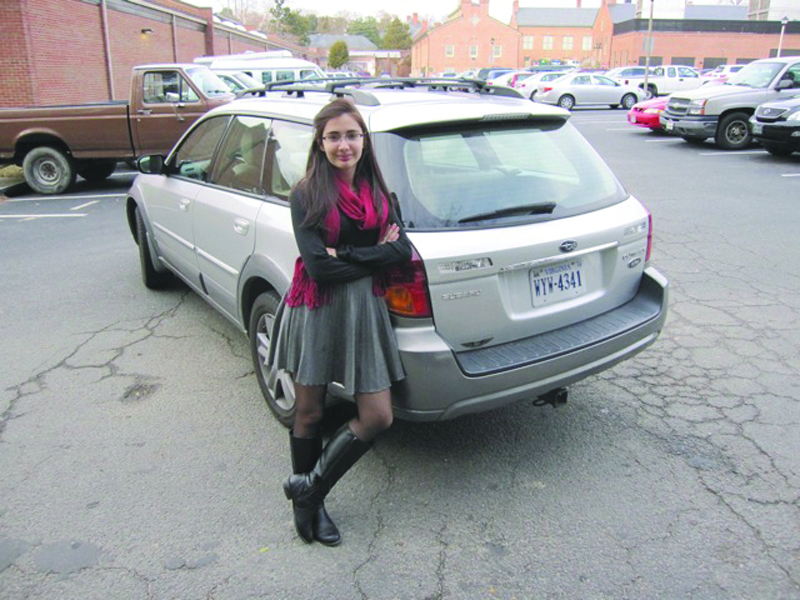When students first arrive at the College of William and Mary, they do not have a car. They do not know the Williamsburg area. They do not know the bus or trolley schedule. At most, students have a bike. Getting to places — the outlets, a grocery store and even doctor appointments — is a difficult endeavor.
For students that seek long-term counseling, this will no longer be an issue.
The new mental health initiative will reimburse students for taxi rides to and from appointments with a long-term counselor. Tribe Rides received $3,000 from the Student Assembly and $1,500 from a grant to operate the pilot program this spring. If the program is successful, Lexie Mellis ’14, a developer of the program, will use next semester as a foothold to obtain additional grant funding.
Mellis developed the program as a direct response to students’ needs. Last February, she asked students what their experience with mental health on campus was through her Facebook page.
“There was a great long list of things people felt dissatisfied with, but one of the biggest ones was they felt they didn’t have access to [long-term] care on campus,” said Mellis. “People said that they were required by the school to go to counseling every week but they couldn’t get off campus. The counseling center does not offer long-term care. They couldn’t figure out where to go; they couldn’t find someone within biking distance who took their insurance — which is a common problem — and then there are people like me who can’t ride a bike. The one thing that seemed actually fixable was the transportation issue.”
Mellis looked at various options, including buying a Zipcar plan, before concluding that a deal with a cab program was the best solution. As the program stands, students will be reimbursed for 50 percent of the cost of a weekly taxi ride to their off-campus counselor.
“It’s a flexible bill,” said SA Senator Daniel Ackerman ’16, a sponsor of the bill. “It allows a lot of different angles. If you can’t afford it at all, we’ll find a way to pay for it. If you can afford most of it, we’ll find a way to pay for a bit. If you can pay for half, we’ll find a way to pay for half. It’s completely confidential, and it’s very understanding.”
The program will serve 20 to 80 students, depending on the size of the subsidy each student needs and the frequency with which they see their counselor. To use this program, students are required to fill out an online form. The questions on this form include the student’s year, where they need to go, and if they have visited the College’s counseling center.
While there is no limit to the amount of sessions a student can attend at the counseling center, the counseling center primarily responds to short-term issues for students. If students need additional care, the center will refer them to off-campus counselors.
“Before, there really wasn’t a way for students to receive extended mental health care,” Senate Chair Kendall Lorenzen ’15 said. “[Mental health] has been an issue for a really long time.”
The College ranked No. 42 on the Daily Beast’s list of most stressful colleges in 2011. According to the Chronicle of Higher Education, nearly one third of college students have sought mental health counseling. For Ackerman, the program has a more personal connection. When he was a junior in high school, one of his best friends committed suicide.
“It probably took me over a month to smile,” Ackerman said. “That’s not just me; there were kids whose lives were touched equally … dramatically. I knew two kids who dropped out of school. My parents wanted me to change schools … The effects of one suicide in terms of everyone else, not just in thinking about committing suicide but in their everyday fulfillment of life, are dramatic. That’s why I want to stress that $3,000 is nothing when you think about one life that it might save.”
Tribe Rides will give its first lift in the spring of 2013.


OH MY GOD! I love this article, and I still can’t believe that this is really happening!
I do want to clear up some misinformation, though–I’m afraid that I was either wrong or misleading on several points, which Claire dutifully reported.
-The TribeRides program is in no way affiliated with HOPE. Although I am a member of HOPE, the idea was fostered completely outside of the HOPE organization, and students will have no part in the curation of the TribeRides process.
-The Counseling Center does not limit student sessions to 7 counseling appointments. They cannot guarantee weekly or biweekly appointments to anyone, but according to Dr. Mann on 12/2, there is no hard limit to the number of sessions a student can receive.
I am so excited to see this program take off next semester, but I just wanted to set the record straight on those points that might be relevant to whether someone else utilizes either TribeRides or the on-campus Counseling Center, which is still a great resource for students!